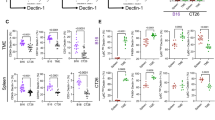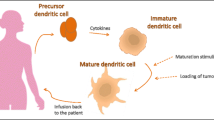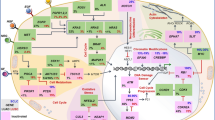Abstract
Epithelial ovarian cancer (EOC) has the highest mortality rate among the various types of gynecological cancers. As the current therapeutic approaches are not enough, the development of more effective treatments to improve the survival of patients with EOC is urgently needed. Mesothelin (MSLN) is a cell surface glycoprotein, which is overexpressed in ovarian cancer tissues. As an immunotherapeutic approach, in this study, we investigated whether the genetically modified dendritic cells (DCs) expressing MSLN could induce cytotoxic T lymphocytes (CTLs) to produce MSLN-specific cytotoxic activity against EOCs. Here, we report that DCs transfected with full-length coding sequence of MSLN could induce MSLN-specific CTLs responses against ovarian cancer lines SKOV3 and OVCAR3 in vitro. Additionally, we identified that the death rates of ovarian cancer cells, killed by MSLN-specific CTLs, were significantly higher than the normal CTLs. Furthermore, IFN-γ production by stimulated MSLN-specific CTLs was significantly higher than that of unstimulated CTLs. This study showed that induced CTLs by DCs with full-length MSLN cDNA have effective immune response against the ovarian cancer cells, indicating that MSLN-transfected DCs vaccine has a promising prospect for the treatment of EOC.





Similar content being viewed by others
References
Holschneider C, Berek J. Ovarian cancer: epidemiology, biology, and prognostic factors. Semin Surg Oncol. 2000;19:3–10.
Landis SH, Murray T, Bolden S, Wingo PA. Cancer statistics. CA Cancer J Clin. 1999;49:8–31.
Permuth-Wey J, Sellers T. Epidemiology of ovarian cancer. Methods Mol Biol. 2009;472:413–37.
Bookman M. Biological therapy of ovarian cancer: current directions. Semin Oncol. 1998;25:381–96.
Kajiyama H, Shibata K, Terauchi M, Yamashita M, Ino K, Nawa A, Kikkawa F. Chemoresistance to paclitaxel induces epithelial–mesenchymal transition and enhances metastatic potential for epithelial ovarian carcinoma cells. Int J Oncol. 2007;31:277–83.
Hoskins WJ, Perez CA, Young RC. Principles and practice of gynecologic oncology. Philadelphia: Limmincott-Raven Publishers; 1997.
Coosemans A, Vergote I, Van Gool SW. Dendritic cell-based immunotherapy in ovarian cancer. Oncoimmunology. 2013;2:e27059.
Spinosa JP, Kanduc D. Ovarian cancer: designing effective vaccines and specific diagnostic tools. Immunotherapy. 2014;6:35–41.
Suzuki S, Shibata K, Kikkawa F, Nakatsura T. Significant clinical response of progressive recurrent ovarian clear cell carcinoma to glypican-3-derived peptide vaccine therapy: two case reports. Hum Vaccin Immunother. 2014;10:338–43.
Riedmann EM. Ovarian cancer vaccine candidate DPX-Survivac: positive interim results from phase 1. Hum Vaccin Immunother. 2012;8:1743.
Chiang CL, Kandalaft LE, Tanyi J, Hagemann AR, Motz GT, Svoronos N, et al. A dendritic cell vaccine pulsed with autologous hypochlorous acid-oxidized ovarian cancer lysate primes effective broad antitumor immunity: from bench to bedside. Clin Cancer Res. 2013;19:4801–15.
Liao JB, Disis ML. Therapeutic vaccines for ovarian cancer. Gynecol Oncol. 2013;130:667–73.
Gilboa E. DC-based cancer vaccines. J Clin Invest. 2007;117:1195–203.
Palena C, Abrams SI, Schlom J, Hodge JW. Cancer vaccines: preclinical studies and novel strategies. Adv Cancer Res. 2006;95:115–45.
Brossart P, Wirths S, Stuhler G, Reichardt VL, Kanz L, Brugger W. Induction of cytotoxic T-lymphocyte responses in vivo after vaccinations with peptide-pulsed dendritic cells. Blood. 2000;96:3102–8.
Schlienger K, Chu CS, Woo EY, Rivers PM, Toll AJ, Hudson B, et al. TRANCE- and CD40 ligand-matured dendritic cells reveal MHC class I-restricted T cells specific for autologous tumor in late-stage ovarian cancer patients. Clin Cancer Res. 2003;9:1517–27.
Chiang CL, Maier DA, Kandalaft LE, Brennan AL, Lanitis E, Ye Q, et al. Optimizing parameters for clinical-scale production of high IL-12 secreting dendritic cells pulsed with oxidized whole tumor cell lysate. J Transl Med. 2011;9:198.
Chang K, Pastan I. Molecular cloning of mesothelin, a differentiation antigen present on mesothelium, mesotheliomas, and ovarian cancers. Proc Natl Acad Sci USA. 1996;93:136–40.
Hassan R, Kreitman RJ, Pastan L, Willingham MC. Localization of mesothelin in epithelial ovarian cancer. Appl lmmunohistochem Mol Morphol. 2005;13:243–7.
Ho M, Bera TK, Willingham MC, Onda M, Hassan R, FitzGerald D, Pastan I. Mesothelin expression in human lung cancer. Clin Cancer Res. 2007;13:5076–81.
Argani P, Iacobuzio-Donahue C, Ryu B, Rosty C, Goggins M, Wilentz RE, Murugesan SR, et al. Mesothelin is overexpressed in the vast majority of ductal adenocarcinomas of the pancreas: identification of a new pancreatic cancer marker by serial analysis of gene expression (SAGE). Clin Cancer Res. 2001;7:3862–8.
Ryu B, Jones J, Blades NJ, Parmigiani G, Hollingsworth MA, Hruban RH, Kern SE. Relationships and differentially expressed genes among pancreatic cancers examined by large-scale serial analysis of gene expression. Cancer Res. 2002;62:819–26.
Hassan R, Bullock S, Premkumar A, Kreitman RJ, Kindler H, Willingham MC, Pastan I. Phase I study of SS1P, a recombinant anti-mesothelin immunotoxin given as a bolus I.V. infusion to patients with mesothelin-expressing mesothelioma, ovarian, and pancreatic cancers. Clin Cancer Res. 2007;13:5144–9.
Hassan R, Schweizer C, Lu KF, Schuler B, Remaley AT, Weil SC, Pastan I. Inhibition of mesothelin-CA-125 interaction in patients with mesothelioma by the anti-mesothelin monoclonal antibody MORAb-009: implications for cancer therapy. Lung Cancer. 2010;68:455–9.
Yokokawa J, Palena C, Arlen P, Hassan R, Ho M, Pastan I, Schlom J, Tsang KY. Identification of novel human CTL epitopes and their agonist epitopes of mesothelin. Clin Cancer Res. 2005;11:6342–51.
Chang CL, Wu TC, Hung CF. Control of human mesothelin expressing tumors by DNA vaccines. Gene Ther. 2007;14:1189–98.
Hung CF, Calizo R, Tsai YC, He L, Wu TC. A DNA vaccine encoding a singlechain trimer of HLA-A2 linked to human mesothelin peptide generates anti-tumor effects against human mesothelin-expressing tumors. Vaccine. 2007;25:127–35.
Feng Y, Xiao X, Zhu Z, Streaker E, Ho M, Pastan I, Dimitrov DS. A novel human monoclonal antibody that binds with high affinity to mesothelin-expressing cells and kills them by antibody-dependent cell-mediated cytotoxicity. Mol Cancer Ther. 2009;8:1113–8.
Nishimura N, Nishioka Y, Shinohara T, Sone S. Enhanced efficiency by centrifugal manipulation of adenovirus-mediated interleukin 12 gene transduction into human monocyte-derived dendritic cells. Hum Gene Ther. 2001;12:333–46.
Huang CY, Cheng WF, Lee CN, Su YN, Chien SC, Tzeng YL, Hsieh CY, Chen CA. Serum mesothelin in epithelial ovarian carcinoma: a new screening marker and prognostic factor. Anticancer Res. 2006;26:4721–8.
Ordóñez NG. Application of mesothelin immunostaining in tumor diagnosis. Am J Surg Pathol. 2003;27:1418–28.
Rump A, Morikawa Y, Tanaka M, Minami S, Umesaki N, Takeuchi M, Miyajima A. Binding of ovarian cancer antigen CA125/MUC16 to mesothelin mediates cell adhesion. J Biol Chem. 2004;279:9190–8.
Gubbels JA, Belisle J, Onda M, Rancourt C, Migneault M, Ho M, et al. Mesothelin–MUC16 binding is a high affinity, N-glycan dependent interaction that facilitates peritoneal metastasis of ovarian tumors. Mol Cancer. 2006;5:50.
Zhang L, Conejo-Garcia JR, Katsaros D, Gimotty PA, Massobrio M, Regnani G, Makrigiannakis A, Gray H, Schlienger K, Liebman MN, Rubin SC, Coukos G. Intratumoral T cells, recurrence, and survival in epithelial ovarian cancer. N Engl J Med. 2003;348:203–13.
Pardoll D. Spinning molecular immunology into successful immunotherapy. Nat Rev Immunol. 2002;2:227–38.
Charbonneau B, Goode EL, Kalli KR, Knutson KL, Derycke MS. The immune system in the pathogenesis of ovarian cancer. Crit Rev Immunol. 2013;33:137–64.
Koidoa S, Nikruib N, Ohanac M, Xiac J, Tanaka Y, Liuc C, et al. Assessment of fusion cells from patient-derived ovarian carcinoma cells and dendritic cells as a vaccine for clinical use. Gynecol Oncol. 2005;99:462–71.
Miyazawa M, Iwahashi M, Ojima T, Katsuda M, Nakamura M, Nakamori M, et al. Dendritic cells adenovirally-transduced with full-length mesothelin cDNA elicit mesothelin-specific cytotoxicity against pancreatic cancer cell lines in vitro. Cancer Lett. 2011;305:32–9.
Conflict of interest
None.
Ethical Statement
This study had received approval from the Ethics Committee of the Cangzhou Central Hospital. Written informed consents were obtained from all blood donors.
Author information
Authors and Affiliations
Corresponding author
Rights and permissions
About this article
Cite this article
Wang, Dh., Wu, Xh., Qian, Sm. et al. Study on the mesothelin-specific cytotoxicity against epithelial ovarian cancer with full-length mesothelin cDNA-transduced dendritic cells. Med Oncol 32, 116 (2015). https://doi.org/10.1007/s12032-015-0561-7
Received:
Accepted:
Published:
DOI: https://doi.org/10.1007/s12032-015-0561-7




